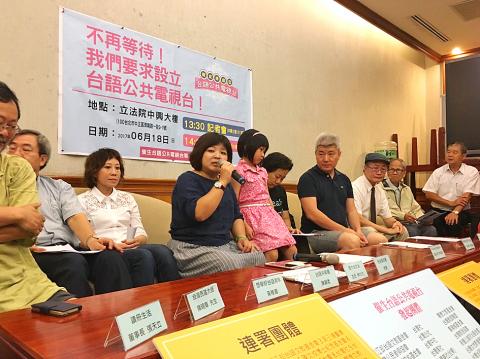A coalition of civic groups yesterday urged the government to establish a Hoklo-language (also known as Taiwanese) public television station to promote local culture and native language instruction.
Thirty-four groups led by the Taiwan Citizen Participation Association and the Taiwan Society called on the government not to ignore repeated calls for a station dedicated to Hoklo language and culture.
Although Hoklo is spoken by the majority of Taiwanese, the dominant media language is Mandarin, which hinders the development of Hoklo, Hakka and Aboriginal languages, the groups said.

Photo: Yang Chun-hui, Taipei Times
While it is legitimate to prioritize the preservation of Hakka and Aboriginal languages with specialized media, the nation is gradually losing its Hoklo heritage and the language should also be protected, they said.
Although Hoklo is spoken by 81.9 percent of Taiwanese, there are no laws, independent government agency or television station dedicated to the language’s development, association chairman Ho Tsung-hsun (何宗勳) said.
Taiwanese who speak Aboriginal languages account for 1.4 percent of the total population, and their languages are protected by the Aboriginal Language Development Act (原住民族語言發展法), the Council of Indigenous Peoples and Taiwan Indigenous TV, Ho said.
Hakka-speaking Taiwanese account for 6.6 percent of the population, and their culture is promoted by the Hakka Basic Act (客家基本法), the Hakka Affairs Council and Hakka TV, he added.
“Former minister of culture Lung Ying-tai (龍應台) under the Chinese Nationalist Party [KMT] administration expressed a vision for a Hoklo-language station. Why does the Democratic Progressive Party government not dare to say the same?” singer Chen Ming-chang (陳明章) said.
“Laws or budgets are not the problem — the problem is a [lack of] resolve,” Chen said.
Minister of Culture Cheng Li-chiun (鄭麗君) had announced that a Hoklo-language radio station would be established.
However, she has not made any clear statement responding to calls for the establishment of a Hoklo TV station, Chen said, criticizing the government’s passivity over the issue.
Taiwan Society vice president Tiunn Hok-chu (張復聚), who is also a physician, said many patients can only speak Hoklo, and doctors should speak to patients in their native languages to ensure high-quality communication and treatment.
Taiwanese below the age of 40 can usually understand Hoklo, but do not speak the language, and it is feared that later generations would not even be able to understand it, he said.
“We are all culpable if our native language disappears after 30 years,” Tiunn said.

‘DENIAL DEFENSE’: The US would increase its military presence with uncrewed ships, and submarines, while boosting defense in the Indo-Pacific, a Pete Hegseth memo said The US is reorienting its military strategy to focus primarily on deterring a potential Chinese invasion of Taiwan, a memo signed by US Secretary of Defense Pete Hegseth showed. The memo also called on Taiwan to increase its defense spending. The document, known as the “Interim National Defense Strategic Guidance,” was distributed this month and detailed the national defense plans of US President Donald Trump’s administration, an article in the Washington Post said on Saturday. It outlines how the US can prepare for a potential war with China and defend itself from threats in the “near abroad,” including Greenland and the Panama

The High Prosecutors’ Office yesterday withdrew an appeal against the acquittal of a former bank manager 22 years after his death, marking Taiwan’s first instance of prosecutors rendering posthumous justice to a wrongfully convicted defendant. Chu Ching-en (諸慶恩) — formerly a manager at the Taipei branch of BNP Paribas — was in 1999 accused by Weng Mao-chung (翁茂鍾), then-president of Chia Her Industrial Co, of forging a request for a fixed deposit of US$10 million by I-Hwa Industrial Co, a subsidiary of Chia Her, which was used as collateral. Chu was ruled not guilty in the first trial, but was found guilty

DEADLOCK: As the commission is unable to forum a quorum to review license renewal applications, the channel operators are not at fault and can air past their license date The National Communications Commission (NCC) yesterday said that the Public Television Service (PTS) and 36 other television and radio broadcasters could continue airing, despite the commission’s inability to meet a quorum to review their license renewal applications. The licenses of PTS and the other channels are set to expire between this month and June. The National Communications Commission Organization Act (國家通訊傳播委員會組織法) stipulates that the commission must meet the mandated quorum of four to hold a valid meeting. The seven-member commission currently has only three commissioners. “We have informed the channel operators of the progress we have made in reviewing their license renewal applications, and

A wild live dugong was found in Taiwan for the first time in 88 years, after it was accidentally caught by a fisher’s net on Tuesday in Yilan County’s Fenniaolin (粉鳥林). This is the first sighting of the species in Taiwan since 1937, having already been considered “extinct” in the country and considered as “vulnerable” by the International Union for Conservation of Nature. A fisher surnamed Chen (陳) went to Fenniaolin to collect the fish in his netting, but instead caught a 3m long, 500kg dugong. The fisher released the animal back into the wild, not realizing it was an endangered species at